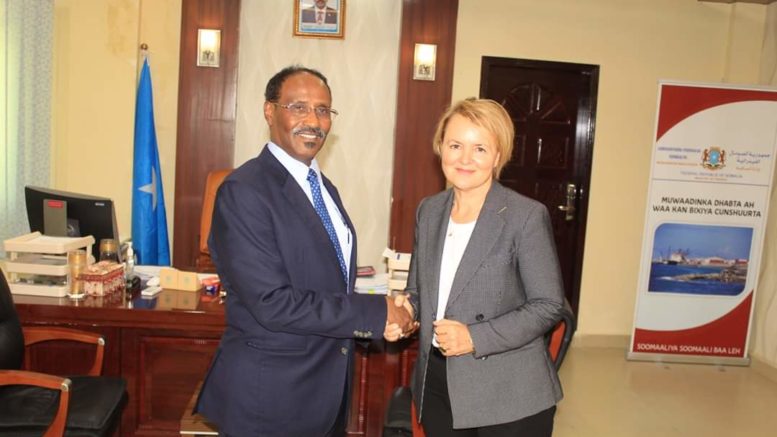n international push to secure sorely needed debt relief for Somalia may be derailed because of a bureaucratic blunder in Washington, undercutting long-standing efforts to stabilize one of Africa’s least developed and most conflict-plagued countries.
The issue has so alarmed some U.S. officials that the U.S. ambassador to the East African country is quietly considering resigning if it isn’t resolved, current and former officials tell Foreign Policy.
The United States spends around half a billion dollars per year in aid and development to help prop up Somalia’s fragile government as it grapples with violence from terrorist groups and chronic instability.
Despite the challenges, the new Somali government under Prime Minister Hassan Ali Khaire has, with U.S. backing, pushed through a number of difficult and unpopular reforms to align the government with international standards on financial governance and transparency.
The reforms have given Somalia a chance to receive debt relief by the spring of 2020 under a program run by the International Monetary Fund and World Bank called the Heavily Indebted Poor Country (HIPC) Initiative.
Such a move would unblock Somalia’s access to sorely needed international financial assistance, a key to helping the country boost its laggard economic growth and stabilize its federal institutions.
The debt relief would have a host of positive knock-on effects, officials say, including allowing Somalia to strengthen its military and confront al-Shabab, one of the deadliest terrorist groups in the world, which operates out of ungoverned spaces in Somalia.
The U.S. Defense Department has sent elite troops to help train Somalia’s army to combat al-Shabab and regularly conducts air strikes in Somalia targeting al-Shabab militants. Debt relief, officials say, would help Somalia get its own house in order to eventually ease the burden on U.S. military and U.S.-led aid programs in one of the poorest and least developed countries in the world.
“There is no economic development and military independence without these IMF and [World Bank programs],” said one former U.S. official familiar with the matter.
But HIPC rules require major creditors, including the United States, to approve writing off Somalia’s debt simultaneously, or it cannot move forward at all. “If the U.S. doesn’t contribute, the whole deal falls apart,” said one Senate aide familiar with the matter.
While securing debt relief for Somalia has been a policy priority for the United States for years, that plan could now be derailed because the State Department and Treasury Department didn’t inform lawmakers they should include authorization to write off Somalia’s debt before Congress finalized its spending bills, according to six current and former U.S. officials and congressional aides who spoke to Foreign Policy on the matter. Some believe it simply slipped through the cracks as the State Department scrambled to prepare its budget priorities with the White House.
“All along, I could not believe all we have invested in Somalia could be squandered over something so small and simple,” said one official.
The State Department declined to comment for the story, and the Treasury Department did not respond to a request for comment.
U.S. Ambassador to Somalia Donald Yamamoto has privately considered quietly resigning if the U.S. government can’t resolve the issue, according to current and former officials familiar with the matter. Yamamoto is a career diplomat with extensive experience in Africa, who previously served as acting assistant secretary of state for African affairs under President Donald Trump from 2017 to 2018 before his current posting in Somalia. He did not respond to a request for comment for this story.

